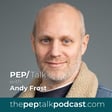
Faith on the Front Foot: Connecting with contemporary culture
“Many [Christians] know what they believe, but they just think ‘I can’t share that in the workplace. I can’t share that in a friendship. I don’t want to get into a fight… But if you listen to people talking on the street, or in the workplace, most people aren’t afraid to share their opinions.”
In a world that often feels fragmented and uncertain, many are searching for purpose and meaning. At the same time, Christians often feel that they are on the ‘back foot’, when it comes to how the church is viewed by wider society. In this episode of PEP Talk, Dr Paul Coulter calls us to step forward with confidence, offering a transforming vision of an identity rooted in Christ. By engaging with contemporary culture, he shares how we can meet the challenges of today with a bold faith that provides meaning, identity and hope – and how we can share that message with those around us.
Our Guest: Paul Coulter's day job is as Head of Ministry Operations for Living Leadership, which seeks to support Christian leaders and their families to live in Christ joyfully and serve Him faithfully. Paul has worked as a medical doctor, a cross-cultural pastor and a lecturer in practical theology. He continues to teach ethics and other subjects in theological colleges. Paul holds primary degrees in medical genetics and medicine, an MA and PhD in theology, and a post-graduate certificate in higher education teaching. Paul lives in Lisburn with his wife, Gar-Ling, and their two children. In his spare time he enjoys cycling, walking and reading historical novels.
Centre for Christianity in Society: www.christianityinsociety.org
Personal website: www.paulcoulter.net



















